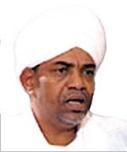UN team disputes Sudan claim that refugees going home
DOW JONES NEWSWIRES
 AL-FASHER, Sudan, Aug 28, 2004 (AP) — Sudan ‘s president says large numbers of African farmers forced from their land by the Darfur conflict are heading home, but U.N. officials contradict the claim, saying many people driven away by Arab militiamen remained too afraid to return.
AL-FASHER, Sudan, Aug 28, 2004 (AP) — Sudan ‘s president says large numbers of African farmers forced from their land by the Darfur conflict are heading home, but U.N. officials contradict the claim, saying many people driven away by Arab militiamen remained too afraid to return.
President Omar el-Bashir, who held talks in the capital, Khartoum, Saturday with U.S. civil rights activist Jesse Jackson, said Arab militia, known as the Janjaweed, are no longer terrorizing the remote western region, the scene of an 18-month conflict that has killed an estimated 30,000 people and forced more than a million from their homes.
“There are large numbers of people now leading normal lives,” el-Bashir told Associated Press Television News, adding that villagers were leaving many of the 147 camps in Darfur for home on a “large scale.”
“There are no incidents reported now of the so-called Janjaweed terrorizing people and forcing them to flee their places to camps. On the contrary there is a return from the camps to the villages.”
But a U.N. team ending a mission that could determine whether Sudan is slapped with international sanctions contradicted el-Bashir’s assertions.
Erick De Mul, the U.N. deputy humanitarian coordinator, said returns are “still in initial stages.”
“There is probably some but very little,” De Mul told reporters after a final meeting with Sudanese officials in Al-Fasher, North Darfur state’s capital.
He called for further action to improve human rights and build African villagers’ confidence in the Sudanese police, saying displaced people still complain of attacks and abuse when venturing outside their camps.
The United Nations describes the situation in Darfur as the world’s worst humanitarian crisis and the United States and aid agencies accuse el-Bashir’s Arab-dominated government of backing the Janjaweed.
The violence began in February 2003 when two African rebel factions took up arms against el-Bashir’s forces, claiming discrimination in the distribution of scarce resources. Since then, the Janjaweed have rampaged across Darfur in a scorched-earth campaign that the U.S. Congress has described as a genocide.
Khartoum rejects the genocide claims and denies that it backs the Janjaweed. The government says it has been working with the United Nations to restore security in Darfur, facilitate aid deliveries and punish Arab militiamen responsible for violence.
Peace talks that began Monday in Nigeria’s capital, Abuja, faltered Saturday after rebels meeting government officials said they will boycott negotiations Sunday because of continuing attacks against civilians.
“While the negotiations are underway in Abuja, the government of Sudan troops and their … militia have violated the cease fire,” said a statement from the rebel Justice and Equality Movement and Sudan Liberation Movement.
The most recent attack occurred Saturday at the village of Klikel Abdousalaam, the rebels said, alleging Sudanese soldiers and Arab militia killed two people and injured two others.
The rebels claim the most deadly of the recent attacks came Thursday, when 64 civilians were killed in a raid on the village of Yassin.
A U.N. spokeswoman in Khartoum had no details on the claims. Sudanese officials were not available for comment.
Earlier Saturday in Abuja, Sudanese authorities said an African Union proposal to send up to 2,000 peacekeepers into Darfur would not be discussed at the talks.
De Mul, who headed one of three U.N. fact-finding teams that have spent three days in the arid Darfur region, said access to internally displaced people “is good and the government is cooperating. The safety, in broad terms inside the camps.”
“Outside the camps, it is still a problem,” he added. “We are still hearing of attacks and abuses when people venture outside, despite the government’s effort of bringing in security forces.”
De Mul refused to say whether he expected the United Nations to impose sanctions next week as threatened. The Security Council has given Khartoum until Aug. 30 to disarm militiamen or face possible sanctions.
Sudan ‘s humanitarian affairs minister, Ibrahim Hamid, said he was “very satisfied with the results we have seen,” and that it was normal many displaced people were too afraid to leave camps and return home.
“A war-affected population will need some time to feel secure,” he said.
Several displaced people at Abu Shouk camp, home to some 43,000 villagers, said they were nervous about the security situation and many had no way of knowing what conditions were like in their villages, some up to 200 kilometers (124 miles) away.
“There were big problems in my village,” Mohammed Badikir Ibrahim, who left his village near Kutum, 70 kilometers (43 miles) away, four months ago, said in broken English. “How it is I do not know?”
As the U.N. deadline approaches, international aid agencies have stepped up their relief efforts.
The U.N.’s World Food Program said the first consignment of emergency food aid left the southeastern Libyan city of al-Kafra Saturday. A convoy of 20 trucks carrying 440 metric tons of wheat flour started a two week, 2,000-kilometer trek across the Sahara desert for Sudanese refugees in Chad.
